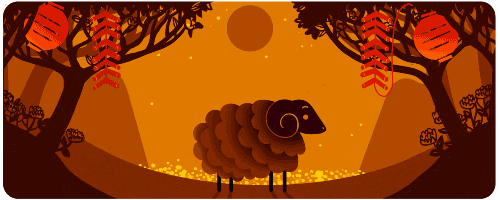
The Spring Festival(1), also known as the Chinese New Year(2), is an important Chinese festival celebrated at the turn of the Chinese calendar(3). Chinese New Year celebrations traditionally run from(4) Chinese New Year's Eve(5), the last day of the last month of the Chinese calendar, to the Lantern Festival(6) on the 15th day of the first month.
| 序號 | 單詞/詞組 | 詞性 | 釋義 |
|---|---|---|---|
| 1 | Spring Festival | 春節 | |
| 2 | Chinese New Year | 中國新年 | |
| 3 | the turn of the Chinese calendar | 中國農歷時間 | |
| 4 | run from | 從...開始 | |
| 5 | Chinese New Year's Eve | 中國新年除夕 | |
| 6 | Lantern Festiveal | 燈節(元宵節) |

Often, the evening preceding(1) ** Chinese New Year's Day(2)** is an occasion(3) for Chinese families to gather for the annual reunion dinner(4). It is also traditional for every family to thoroughly cleanse(5) the house, in order to sweep away(6) any ill-fortune(7) and to make way for good incoming luck. Windows and doors will be decorated with red color paper-cuts(8) and couplets(9) with popular themes of "good fortune(10)" or "happiness", "wealth", and "longevity(11)." Other activities include lighting firecrackers(12) and giving money in red paper envelopes.
| 序號 | 單詞/詞組 | 詞性 | 釋義 |
|---|---|---|---|
| 1 | procede | v | 在...之前發生(或出現) |
| 2 | Chinese New Year's Day | 大年初一 | |
| 3 | occasion | n | 時刻 |
| 4 | annual reunion dinner | 團圓飯 | |
| 5 | cleanse | v | 使清潔;潔凈;洗滌 |
| 6 | sweep away | 掃除;掃去 | |
| 7 | ill-fortune | n | 厄運 |
| 8 | paper-cut | n | 剪紙 |
| 9 | couplet | n | 對句;對聯 |
| 10 | good fortune | 幸運;好運;福氣 | |
| 11 | longevity | n | 長壽;長命;持久 |
| 12 | firecracker | n | 鞭炮;爆竹 |


It is celebrated in countries and territories(1) with significant(2) Chinese populations, including Mainland China(3), Hong Kong, Macau, Taiwan, Singapore, Thailand,Indonesia,Malaysia,Mauritius,Philippines,and also in Chinatowns elsewhere.
| 序號 | 單詞/詞組 | 詞性 | 釋義 |
|---|---|---|---|
| 1 | territory | n | 地區 |
| 2 | significant | adj | 大量的 |
| 3 | Mainland China | 中國大陸 |

有關春節內容的相關詞匯(Related Words)
| 中文 | 英文 | 注釋 |
|---|---|---|
| 春節 | The Spring Festival | Chinese New Year |
| 除夕 | The New Year's Eve | eve of lunar New Year |
| 正月初一 | The First Day | First Day of the lunar New Year |
| 農歷 | The Chinese Calendar | Lunar Calendar |
| 元宵節 | The Lantern Festival | |
| 對聯 | Antithetical Couplet | 讀音['k?plit] |
| 春聯 | Spring Festival couplets | |
| 紅包 | Red Envelopes | money wrapped in the red envelops |
| 煙花 | Fireworks | |
| 爆竹 | Firecrackers | scare off the evil spirit |
| 年糕 | Nian-gao | rise cake; New Year cake |
| 春晚 | CCTV Spring Festival Gala | |
| 燈謎 | Riddles | (讀音 ['r?dl]) written on Lanterns |
| 燈會 | Exhibit of Lanterns | |
| 守歲 | Staying-up | |
| 拜年 | Give New Year's greetings | New Year's visit |
| 禁忌 | Taboo | 讀音[t?'bu] |
| 去晦氣 | Get Rid of the Ill- fortune | |
| 祭祖宗 | Offer Sacrifices to One's Ancestors | |
| 壓歲錢 | Gift money(money given to children as a lunar New Year gift) | |
| 辭舊歲 | Bid Farewell to the Old Year | |
| 掃房 | Spring Cleaning | comprehensive house-cleaning |
| 獅舞 | Lion Dance | to dispel evil and bring good luck |
| 舞龍 | Dragon Dance | to expect good weather and good harvests |
| 團圓飯 | Family Reunion Dinner | |
| 餃子 | Jiao-zi | Chinese dumplings |
| 湯圓 | Tang-yuan | ball-shaped dumplings made of sweet rice, with various flavored fillings |
| 年貨 | Spring Festival Special Purchase | buy specials products for the New Year |
| 八寶飯 | Eight Treasures Rice Pudding | |
| 糖果盤 | Candy Tray | |
| 什錦糖 | Assorted Candies | Sweet and Fortune |
| 蜜冬瓜 | Candied Winter Melon | Growth and Good Health |
| 西瓜子 | Red Melon Seed | joy, happiness, truth and sincerity |
| 金桔 | Kumquat | |
| 糖蓮子 | Candied Lotus Seed | |
| 糖藕 | Candied Lotus Root | fulfilling love relationship |
| 紅棗 | Red Dates | prosperity |
| 花生 | Peanut | 讀音[?pi??n?t] |

January 1st (lunar calendar)
Paying a New Year's vist
Following the New Year's Eve is the first day of the Spring Festival, a day for paying a New Year's vist, during which people will be busy in giving best wishes to one another. It is said that people shouldn't dump things on the first day of the new year, so that they would be able to keep whatever worth of fortune they will be in possession of in the next year.
正月初一:拜年
除夕過后就是正月初一,人們都會外出拜年。這一天人們忙得不亦樂乎,彼此表達美好的祝福。據說,正月初一這天人們不能扔東西,這樣他們就可以把財富留在自個的家里,來年就會福星高照,幸福滿滿。